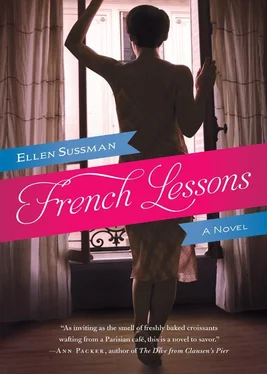“Take your time. This is a good place to rest.”
They look out into the park. A crowd gathers around a sculpture, and Josie sees the head of Le Penseur towering above the mere mortals below. Other sculptures dot the landscape but Josie doesn’t care about them. She loves the green water in the basin, the long stretch of green lawn, the abundance of green leaves on the rows of trees. A gust of wind stirs the air around her and with it the smell of newly cut grass. She’s wrapped in her green blanket.
“I read the book so many times I could still probably recite the first paragraphs,” Josie says. “But I’ll spare you. It’s an odd little story. A young girl loses her parents in the Champ de Mars. She looks everywhere for them-and then she decides that they’ve gone up to the top of the Eiffel Tower without her. But she’s scared of heights. She can’t go after them. So she waits and waits. Finally it begins to get dark and her parents never appear. With terror in her heart, she begins to walk up the stairs of the tower.”
“Why doesn’t she take the elevator?”
“There are only steps. This is fiction.”
“Of course.”
“She walks and walks, and the higher she climbs the more frightened she becomes. But she can’t go back. She has to decide which is more frightening-life without her parents or climbing to the top of the tower. She keeps climbing. The sky darkens and night falls and soon all the lights of the city come on and there are as many stars below her as there are above. She’s never seen anything so beautiful in her whole life. She forgets that she’s scared and she runs to the top of the tower. There she circles the observation deck, looking up to the sky and down to the city streets with all the brilliant lights. She has no fear-she’s on top of the world.”
Josie pauses and takes a deep breath. Her stomach tightens and releases.
“Are you okay?”
“I’m fine.”
“And the girl on the top of the Eiffel Tower?”
“A guard comes up to her. ‘Mademoiselle,’ he says. I loved that word when I was little. It was my first French word. Mademoiselle. ‘Oui, monsieur,’ she says. She’s a very well-mannered little girl.”
“Is she American?”
“Oh, no. She’s very French. She lives on the edge of the Champ de Mars and she’s never ever gone up to the top of the Eiffel Tower. Now here she is. And she can see all of her city below her.”
“Her parents?”
“You are impatient,” Josie scolds. “So the guard tells her that the tower is closing and she’ll have to climb down again. She tells him that she’s lost her parents. He promises her that they’ll be waiting for her at the bottom of the tower. So she climbs down the many, many stairs, as happy as can be, because she’s no longer afraid of anything. At the bottom of the tower she steps out and it’s Paris and everything she’s ever known, but it all looks magically different now. She doesn’t see her parents anywhere and she skips home, imagining a life without parents. Maybe she’ll never go to school! Maybe she’ll kiss the boy she likes! Maybe she’ll wear the purple tights her mother hates! When she gets to her house she looks up into the window of her living room and she sees her parents standing there, under the bright chandelier, looking out. They don’t see her. She looks back at the Eiffel Tower. It’s sparkling with light. It’s positively luminous. When she looks back at her own house the lights go out.”
Josie smiles and rests her hands on her belly.
“That’s the end?” Nico asks.
“The end. In big, swirly letters. La fin. ”
“This is a French book?”
“Of course it is. If it were an American book the girl would never be allowed to climb the stairs alone and the guard would have taken her to the police station, and even if she ran away and got home and saw her parents in the window she would have run to them and promised to never ever get lost again.”
“You think that’s it? She doesn’t go home again?”
“It’s not clear. Maybe she does. Maybe she doesn’t.”
“I think that’s a terrifying story,” Nico says.
“There you go. Vive la différence. ”
“Between boys and girls?”
“Between a nice young Frenchman with blue eyes and a crazed American woman.”
Nico reaches over and tucks a strand of hair behind her ear.
“You’re not crazy.”
“And that’s another thing. I need a haircut,” Josie says.
“Perhaps we can do that.” His fingers linger briefly in her hair.
“All in one day?” Josie asks.
“And you thought I was a mere French tutor.”
Josie sees Nico’s mischievous glance and notices how young he looks. There are no creases in the corners of his eyes. She has spent so many months looking into Simon’s eyes.
“I made up that story,” Josie tells him. “There is no book. There never was.”
Nico smiles. “Perhaps you’re not crazy, but you’re very creative.”
“I think the little girl never goes home. I think she finds the guard and asks him to take her home with him.”
“That might be dangerous.”
“But he’s a very nice man. He owns three dogs, all of them bigger than the little girl. They live together in his tiny apartment on the top of a hill in Montmartre.”
“What about her parents?”
“You’re so responsible,” Josie complains.
“I would miss my little girl,” Nico says.
“Of course you would.” She remembers that Nico has a child somewhere in Morocco, a child he’s never seen. She thinks of Nico as a child, lost in the root cellar, his parents searching for him. This is a man looking to be found, she thinks.
Simon stroked her back. They were sprawled in bed, post-sex, pre-sex, all of their time together a blur of sex. They were in San Francisco, at yet a different hotel. Simon saw someone he knew at the Clift and Josie had to pretend she was a stranger, asking directions to a club. “Sorry,” he told her, the friend in earshot. “I can’t tell you anything about clubs in this city. I’m an old man. Why don’t you ask the concierge?” Later Simon told her that the friend had said, “That girl is hot,” and Simon had said, “I hadn’t noticed.”
“Of course you wouldn’t,” the man had said. “You’re the last married man in America.”
Simon had informed his wife about a series of Saturday meetings-he’d invented a nonprofit group that needed his expert help. He’d told his admin not to schedule anything for him at the end of the day on Friday because he needed to get back to San Rafael for a project he was working on with Brady. He was lying to everyone, and he did it with such ease that Josie thought he must be lying to her as well.
“How do you know this is love,” she asked, “rather than love of sex?”
He ran his tongue up the line of her spine.
She rolled over and faced him. “You said you loved me.”
“I do.”
“Maybe you just love sex with me.”
“I do.”
“Why is it that now that I have love, I’m immediately scared of losing love?”
“You think too much. Stop thinking.”
“When we make love I stop thinking.”
“Then let’s make love. It’s been too long.”
“Does this-does sex-matter more than anything else? Does it matter more than raising kids and having dinner parties and going to Cabo on vacation?”
“I wish I could do all of that with you.”
“But you can’t.”
“You wouldn’t even want it, Josie. You’re twenty-seven years old.”
“I don’t know.”
“Please. Come here.”
“I’m right here.”
“Come closer.”
“Did you have this with your wife?”
Читать дальше












